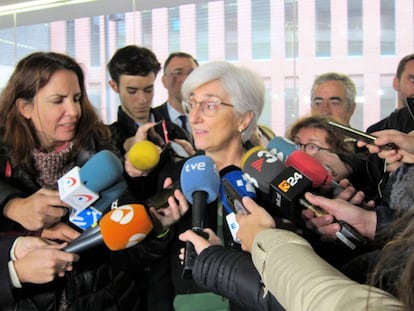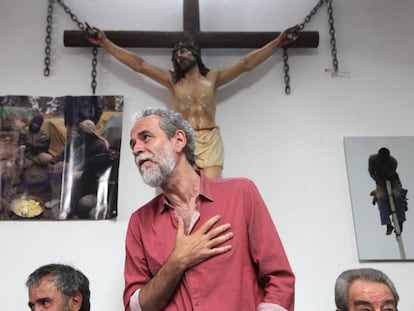Spain¡¯s prosecutor general to limit ¡°disproportionate¡± hate crime accusations
Move comes after comedian Dani Mateo appeared in court on Monday for blowing his nose on the Spanish flag in a TV sketch


Spanish Prosecutor General Mar¨ªa Jos¨¦ Segarra on Monday asked for a ¡°serene reflection¡± on the subject of hate crimes, in order to come up with a judicial response to them that ¡°is proportional to the crime, acts as a deterrent, and protects civil liberties.¡±
Segarra¡¯s department is finalizing a document with binding guidelines that will be sent to all prosecutors in Spain in early 2019. The goal is to develop a unified approach to hate crimes, while sticking to the criteria established by the European Court of Human Rights in a series of rulings that condemned Spain for applying ¡°disproportionate¡± punishment.
The Prosecutor General supports alternatives to incarceration for people convicted of online hate crimes
Since her appointment in July, Segarra has made it a priority to address the way hate crimes are handled by the criminal justice system. Spain has seen several high-profile cases in recent months that have raised questions about the limits of freedom of speech, especially on social media.
In its most recent annual report from September 2018, the Prosecutor General¡¯s Office supported alternatives to incarceration for people convicted of online hate crimes. The government has pledged to study this option, but has yet to take any steps in that direction.
On Monday, Segarra insisted on the need to ¡°reflect¡± on this type of crime. Her statement came almost at the same time as a television comedian named Dani Mateo was appearing in a Madrid court, accused of a hate crime for blowing his nose on the Spanish flag as part of a sketch on satirical current affairs show El Intermedio.
Spanish Congress is working on a new reform of the criminal code sponsored by the leftist group Unidos Podemos
Article 510 of the criminal code sets out a top punishment of one to four years of prison for individuals who encourage hatred or violence against a person or a group for reasons of race, religion and antisemitism, among others.
Segarra warned that these crimes have been on the rise in recent years, especially on social media, and that both the perpetrators and the victims are often minors.
Her department believes that prosecutors should remain vigilant, but feels that disproportionate punishment is being used on occasion. On Monday, Segarra admitted that prosecutors have not always shown ¡°a unity of action,¡± but hoped that the upcoming guidelines document will solve that problem.
Strasbourg rulings
The Strasbourg-based European Court of Human Rights has issued several rulings condemning Spain for violating freedom of expression. The cases included Catalan separatists who burned a picture of the king, and a leader of the Basque radical left who called the monarch ¡°the torturer-in-chief.¡±
In its annual report, the Prosecutor General¡¯s Office said that part of the problem lies with a reform of the Criminal Code made in 2015 by the conservative Popular Party (PP), which expanded the kinds of conduct that could be prosecuted as hate crimes. The reform also established tougher punishment for online crimes.
Yet these changes, said Segarra, did not lead to ¡°an unequivocal category for hate crimes.¡± Instead, these remain ¡°disseminated¡± throughout the criminal code, making things complicated for prosecutors. ¡°We must seek solutions for their interpretation,¡± said Segarra.
Spanish Congress is working on a new reform of the Criminal Code sponsored by the leftist Unidos Podemos group, which seeks to protect freedom of expression. The draft document wants to decriminalize actions such as insulting the Crown or offending religious sentiment. It also considers that Article 510 of the criminal code is ¡°ambiguous,¡± and asks to use EU case law as a basis for punishment.
English version by Susana Urra.
Tu suscripci¨®n se est¨¢ usando en otro dispositivo
?Quieres a?adir otro usuario a tu suscripci¨®n?
Si contin¨²as leyendo en este dispositivo, no se podr¨¢ leer en el otro.
FlechaTu suscripci¨®n se est¨¢ usando en otro dispositivo y solo puedes acceder a EL PA?S desde un dispositivo a la vez.
Si quieres compartir tu cuenta, cambia tu suscripci¨®n a la modalidad Premium, as¨ª podr¨¢s a?adir otro usuario. Cada uno acceder¨¢ con su propia cuenta de email, lo que os permitir¨¢ personalizar vuestra experiencia en EL PA?S.
?Tienes una suscripci¨®n de empresa? Accede aqu¨ª para contratar m¨¢s cuentas.
En el caso de no saber qui¨¦n est¨¢ usando tu cuenta, te recomendamos cambiar tu contrase?a aqu¨ª.
Si decides continuar compartiendo tu cuenta, este mensaje se mostrar¨¢ en tu dispositivo y en el de la otra persona que est¨¢ usando tu cuenta de forma indefinida, afectando a tu experiencia de lectura. Puedes consultar aqu¨ª los t¨¦rminos y condiciones de la suscripci¨®n digital.










































